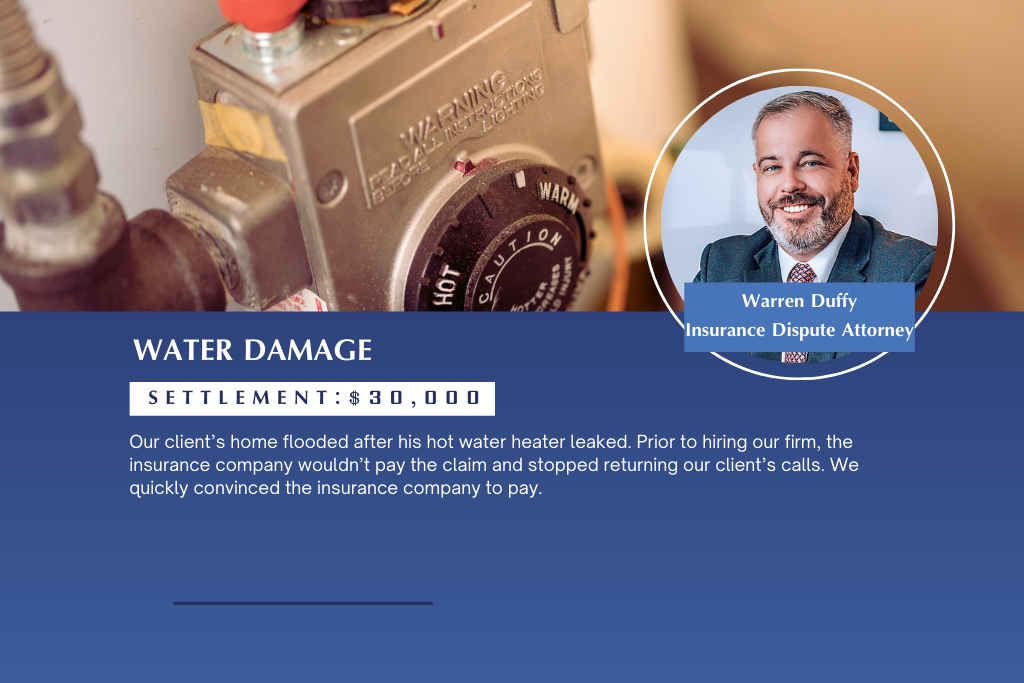How is bad faith defined under Florida law? In order to understand Florida’s bad faith insurance laws, it is important to first define what is meant by bad faith. Per Florida Statutes section 624.155, bad faith on the part of an insurance company is failing to settle a claim even if it had the opportunity to do so fairly and honestly. This has caused many insurance disputes in Florida.
Bad faith can be defined as a dishonest or deceitful act, or a breach of faith. In the insurance context, bad faith generally refers to an insurer’s refusal to pay a valid claim, or its attempt to avoid paying a claim.
Insurance companies are expected to conduct themselves in good faith when handling claims, and they can be held liable for any bad faith actions that they take. If you feel that your insurance company has not acted in good faith with respect to your claim, you may want to speak with an attorney experienced in dealing with these types of cases.
Our law firm was built around helping Florida policyholders and holding insurance companies responsible when they have acted in bad faith. You can call (727) 821-3195 at any time (24/7) to get connected with an experienced insurance dispute attorney. We’ll review your insurance claim for free to see if we can help.

The Cliff Notes: Key Takeaways From This Post
We deep dive into Florida’s bad faith insurance laws; however, here are the key bullet points if you are in a rush:
- Insurers have a duty of good faith which requires them to act honestly and fairly, make a reasonable effort to settle claims, be informed of any opportunities for settlement, look into the facts, take into account fair settlement offers and settle when possible.
- Bad faith claims can occur when an insurer unreasonably denies coverage or payout (first-party), or refuses to defend/settle/indemnify/investigate a claim for someone other than the policyholder (third-party).
- Common examples of bad faith include delaying payment, denying a claim that is covered under the policy, and failing to conduct a full investigation.
- Statutory and common law bad faith claims can be brought against insurers in Florida if they have acted in bad faith.
- In order to file a complaint, one must exhaust their administrative remedies with the insurer and provide detailed information.
- Hiring an experienced insurance dispute attorney is recommended when pursuing a bad faith claim.
What Does Your Insurer’s Duty of Good Faith Really Mean For You?
Assuming you have filed an insurance claim correctly, an insurer has a duty of good faith in handling that claim. This means the insurer must deal with you, the policyholder, in good faith which means they must act honestly and fairly. The insurer must also make a reasonable effort to settle your claim. If the insurer fails to act in good faith, they may be liable for damages. As we mentioned earlier, failure to act in good faith includes failing to investigate a claim or delaying payment.
If you have trusted the insurer in handling your insurance claim, then the insurer is required to agree to work on a claim in good faith and with care no matter what. This requires them to inform you of any opportunities for settlement, what the likely outcome would be, warning you of any possible pitfalls, and advising steps that could be taken to avoid them.
The insurer is also required to look into the facts, take into account a fair settlement offer under the circumstances, and settle when possible. Diligence and care are vital when it comes to investigating and evaluating claims against an insured party – therefore, any negligence has no place in the duty of good faith.
Common Bad Faith Actions From Insurance Companies in Florida
A first-party claim is when an insurance company unreasonably denies coverage or a payout. An example of this would be if you have homeowner’s insurance, but they refuse to pay for the damage a coastal storm did to your roof – even though it’s included in your policy.
A third-party claim occurs when an insurance policy refuses to defend, settle, indemnify, or investigate a claim for someone other than the policyholder (first party), such as when the policyholder buys insurance to protect against claims made by another person (third party).
Real Life Bad Faith Examples – Property Insurance Claims
If an insurance company takes too long to evaluate a claim, it may refuse to pay up. This is done in the hopes of forcing the policyholder to give up pursuing the claim. State insurance laws dictate when an insurance company must acknowledge or reject a claim, which ranges from 15 to 60 days.
For example, if a leaking pipe causes water damage to a property, the insurer would delay investigating the claim for more than two months after the policyholder files a claim.
Real Life Bad Faith Examples – Auto Insurance Claims
Auto insurance companies are frequently guilty of bad faith in their dealings with policyholders. A common example is when a car insurance company denies a claim that is clearly covered under the auto policy. Another common bad faith tactic is when an insurer fails to conduct a complete investigation.
For example, a policyholder submits a claim for car damage that occurred while the car was parked on the street. The claims adjuster denies the claim after speaking with the policyholder over the phone, determining that the damage was pre-existing. The adjuster makes this determination without considering repair shop estimates or inspecting the damage in person.
Statutory vs Common Law Bad Faith Claims Under Florida Law
Bad faith claims in Florida can either be brought under Florida Statute 624.155, or under the common law. Florida Statute 624.155 provides a cause of action against an insurer who “unreasonably delays or denies payment of benefits due to the insured.” In order to bring a claim under Florida Statute 624.155, the insured must first exhaust their administrative remedies with the insurer. This means that the insured must give the insurer a chance to properly investigate the claim and make a decision on benefits before filing a lawsuit.
Common law bad faith claims are brought when an insurer acts in bad faith towards its insured, but does not necessarily unreasonably delay or deny payment of benefits. Common law bad faith claims can be brought even if the insured has not yet exhausted their administrative remedies. To file a common law claim, you must be able to prove that the insurer’s actions were unreasonable and that they knew or disregarded the fact that their actions were unreasonable.
A statutory claim, for example, need only show that a benefit to which the insured was entitled under the policy was unreasonably delayed or denied.To succeed on either type of bad faith claim in Florida, the insured must prove that the insurer acted in bad faith.
This can be shown by proving that the insurer:
- Intentionally delayed or denied payment of benefits owed;
- Knowingly failed to investigate the claim in a reasonable manner;
- Failed to properly evaluate the evidence in the claim; or
- Refused to pay benefits without a legitimate reason.
If you have had your insurance claim denied, or if your insurer is unreasonably delaying payment of benefits, you may have a bad faith claim against your insurer.

How To File a Bad Faith Insurance Claim in Florida
Once you have decided to file a bad faith insurance claim, you can file a complaint with the Florida Department of Financial Services. You can do this by mail or online.
In your complaint, be sure to include:
Your Name, Address, & Telephone Number
There are two ways to file a bad faith insurance claim in Florida. You can either go through the Florida Department of Financial Services, or you can go to court. In your complaint, you will need to include your name, address, and telephone number; as well as keywords like “Florida” and “insurance dispute attorney.” This will help people who are looking for information about this kind of lawsuit find your complaint.
The Name of the Bad Faith Insurance Company
It should come as no surprise that you’ll need to clearly identify the insurance company that you are filing a bad faith complaint against.
Describe Events Leading Up To Your Complaint
In your complaint, you will need to describe what happened that led you to believe the insurance company acted in bad faith.
Include Additional Relevant Information (If Available)
When filing a Florida bad faith insurance claim, it is important to include as much relevant information as possible. This will help the Florida Department of Financial Services or a court to understand your complaint and how the insurance company acted in bad faith.
Another way to file a bad faith insurance claim is to hire an insurance dispute attorney. An insurance dispute attorney can help you in a number of ways. First, they can help you investigate your claim to see if there is evidence of bad faith. They can also help you negotiate with the insurance company to try to get them to pay the benefits you are owed. Finally, if necessary, they can file a lawsuit on your behalf.
Why You Should Hire an Insurance Dispute Attorney Experienced with Bad Faith Claims
When you’re involved in a dispute with your insurance company, it’s important to have an experienced insurance dispute attorney on your side. An attorney who is experienced in bad faith claims will know the ins and outs of Florida’s bad faith laws and how to best proceed to validate your claim. If your insurance company has acted in bad faith, an attorney can help you file a lawsuit against them and may be able to recover damages.
Have a Bad Faith Claim? Contact Our Experienced Florida Insurance Dispute Attorneys
If you feel that your insurance company has not acted in good faith with respect to your claim, it is important to speak with an attorney who understands bad faith claims. At the law firm of Herman & Wells, our insurance dispute attorneys are experienced in dealing with bad faith insurance claims and know how to best protect your interests.
We offer free consultations so that you can discuss your case with one of our attorneys and find out what steps need to be taken next. Don’t let the insurance company take advantage of you – contact us today for help.

